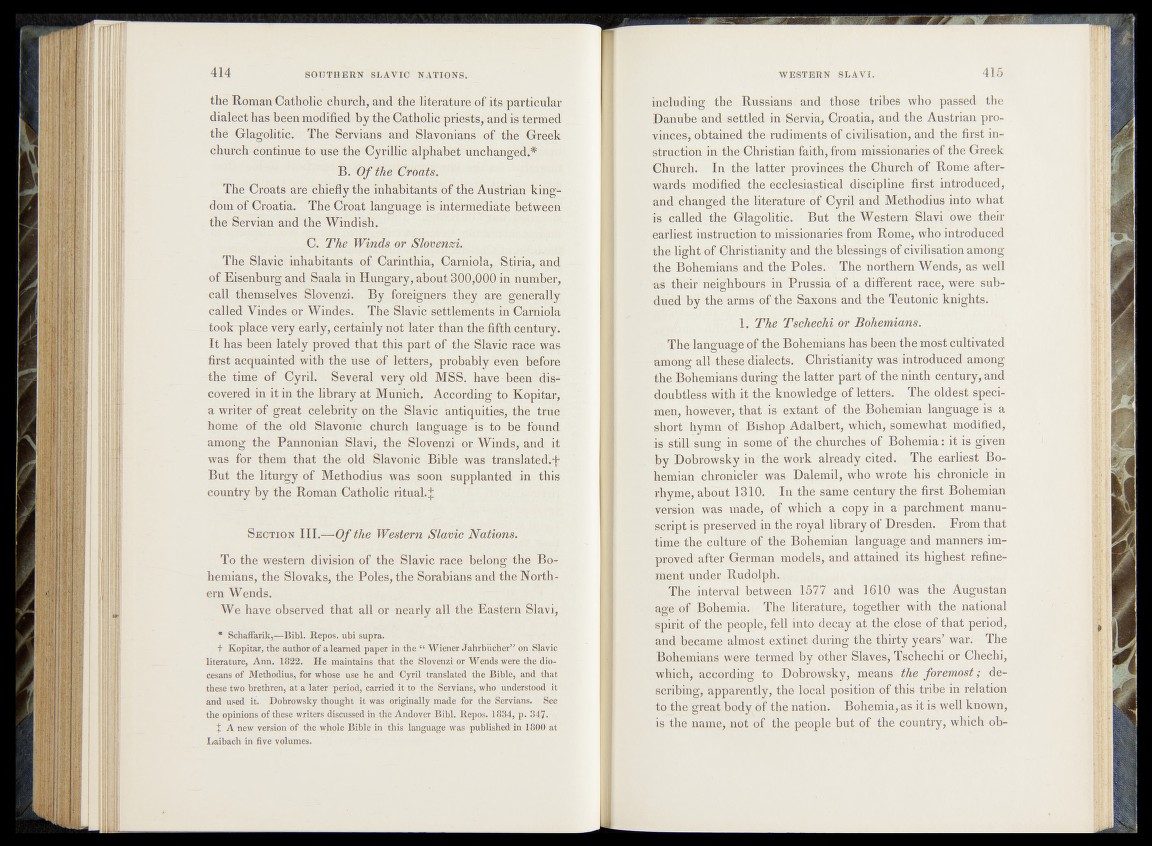
the Roman Catholic church, and the literature of its particular
dialect has been modified by the Catholic priests, and is termed
thè Glagolitic. The Servians and Slavonians of the Greek
church continue to use the Cyrillic alphabet unchanged.*
B. O f the Croats.
The Croats are chiefly the inhabitants of the Austrian kingdom
of Croatia. The Croat language is intermediate between
the Servian and the Windish.
C. The Winds or Slovenzi.
The Slavic inhabitants of Carinthia, Carniola, Sfiria, and
of Eisenburg and Saala in Hungary, about 300,000 in number,
call themselves Slovenzi. By foreigners they are .generally
called Vindes or Windes. The Slavic settlements in Camiola
took"place very early, certainly not later than the fifth century.
It has been lately proved that this part of the Slavic race was
first acquainted with the use of letters, probably even before
the time of Cyril. Several very old MSS. have - been discovered
in it in the library at Munich. According to Kopitar,
a writer of great, celebrity on the Slavic antiquities,? the true
home of the old Slavonic church language.-is to be found
among the Pannonian Slavi, the Slovenzi or Winds, and it
was for them that the old Slavonic Bible was translated.f
But the liturgy of Methodius was soon supplanted in
country by the Roman Catholic ritual.
S e c t io n I I I .— O f the Western Slavic Nations.
To the western division of the Slavic race belong the. Bo-r
hemians, the Slovaks, the Poles, the Sorabians and the Northern
Wends.
We have observed that all or nearly all the Eastern Slavi,
• Sehaffarik,-—Bibl. Repos, ubi supra.
+ Kopitar, the author of a learned paper in the. “ Wiener Jahrbiicher” on Slavic
literature, Ann. 1822. He ffiaintaxfifT that the. Slovenzi or Wends were the diocesans
of Methodius, for whose use he and Cyril translated the Bible, and that
these two brethren, at a later period, carried it to the Servians, who understood it
and used it. Dobrowsky thought it was originally made for the Servians. See
the opinions of these writers discussed in the Andover Bibl. Repos. 1834, p* 347.
- X A new version of the whole Bible in this language was published in 1800 at
Laibach in five volumes.
including the Russians and those tribes who passed the
Danube and settled in Servia, Croatia, and the Austrian provinces',
obtained the rudiments of civilisation, and the first instruction
in the Christian faith, from missionaries of the Greek
ChurChi In the latteryproyinces the Church of Rome afterwards
modified the,, ecclesiastical discipline first introduced,
arid changed t||e literature of Cyril and Methodius into what
is called the Glagolitic. But the Western Slavi owe their
earliest instruction to missionaries from Rome, who introduced
the light of Christianity and the "hiessings of civilisation among,
the Bohemians and the Poles-.' The northern Wends, as well
-as their neighbours in Prussia of a different race, were subdued
by the arms of the Saxons and the Teutonic knights! 7
1. The Tschechi or Bohemians,
di The language of the Bpheriiians,has! been the most cultivated
among a ll these dialects. - Christianity was introduced among
the Bohemians during thegfatter part of the ninth century, and
doubtless with it the knowledge of letters. The oldàs| specimen,
however,; t h a t - e x t a n t of 4|jje Biohé|àian language is a
short hymn* of Bishop,Adalbert,, which, somewhat modified,
is still sung in some of the churches of Bp.|uppk : it ds given
Dobrowsky in'the work already^cited. The earliest Bohemian
chronicler was Dalemil, w^o.xyjote his chronicle in
rhyme, about 1310. In the same century .the first Bohemian
version was made, of which a copy in a'parchment..manuscript
is preserved, in the royal library of Dresden. From that
time the culture e ? the Boheiriian language and manners improved
after German models, and attained highest, refinement
under Rudolph.
The .interval between 1577 and ^ 1 0 was the Augustan
age of Bohemia.* The literature, together with the national
spirit of the people, fell into decay at, the dose of that period,
and became almost extinct during the thirty years’ war. The
Bohemians were termed by other Slaves, Tschechi or Chechiy
which, according to Dobrowsky, means the foremost ; describing,
apparently, the l&ai position of this trri^e ih relation
to the great body êf the natiori. Bohemia, as it is. well known,
is the name, not of the neqple but of the country, which ob